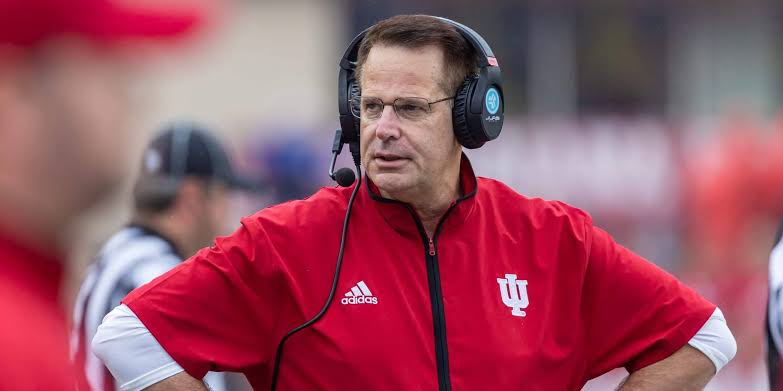“Dodging Competition? Curt Cignetti Slammed for Softening Indiana’s Future Schedule”
After a historic Playoff run, the Hoosiers’ latest scheduling move is stirring up outrage — and questions about what they’re really building in Bloomington.
BLOOMINGTON, Ind. — The fairytale rise of Curt Cignetti and the Indiana Hoosiers may have captured national attention in 2024 — but the glow is quickly dimming in 2025. The program is under fire after quietly backing out of a scheduled home-and-home series with Virginia, raising fresh concerns about Indiana’s credibility, competitiveness, and long-term intentions under Cignetti’s leadership.
The canceled matchup, originally slated for 2027 and 2028, would have pitted the Hoosiers against a fellow Power Five program in the ACC. Instead, Indiana will pay $500,000 in penalties to the Cavaliers and replace them with Kennesaw State (2027), Austin Peay (2028), and Eastern Illinois (2029) — three lower-tier programs that combined for just nine total wins last season.
It’s a decision that’s ignited a firestorm of criticism across the college football landscape, especially coming on the heels of Indiana’s improbable College Football Playoff berth last season — the first in school history. That run already came with controversy, as skeptics questioned whether Indiana deserved its spot in the final four over blue-bloods like Alabama and Miami. Now, with the Hoosiers ducking Power Five competition in their future schedule, those doubts are intensifying.
“This sends the wrong message at the worst time,” said one Big Ten analyst. “After everything Indiana accomplished in 2024, this feels like a step backwards — or worse, like they’re gaming the system.”
Cignetti, who inherited a program on life support and turned it into a playoff contender in a single season, has yet to comment publicly on the scheduling change. But his silence hasn’t softened the blow. Critics argue that swapping Virginia for teams that would struggle in the FCS playoffs — let alone the Big Ten — damages Indiana’s national perception and could hurt them in future playoff debates.
The Risk of Playing It Too Safe
In today’s college football landscape, strength of schedule is more than just a stat — it’s a statement. Programs that play big, get rewarded big. And in the new 12-team Playoff era, every non-conference opponent matters.
Indiana’s decision might give them more winnable games on paper, but it comes at a cost. Not just the $500,000 owed to Virginia, but the reputational hit that comes from appearing to avoid legitimate competition.
More troubling? This move could set a dangerous precedent. If Indiana believes it can secure a playoff berth without scheduling quality non-conference opponents, what’s to stop other fringe contenders from following suit?
Backlash Beyond the Big Ten
This isn’t just a local issue. National voices are chiming in — from analysts to former coaches — calling the Hoosiers’ move “soft,” “strategic,” and even “cowardly.” Fans of programs that narrowly missed the 2024 Playoff see this as validation for their complaints — that Indiana didn’t earn their place, and worse, aren’t willing to fight for it again.
Social media hasn’t been kind either, with fans flooding Indiana’s official football channels demanding answers and calling on Cignetti to explain the program’s direction.
The Road Ahead Looks Bumpy
Indiana still has time to prove this was a smart, calculated decision — perhaps for financial reasons, or internal scheduling flexibility. But with no official explanation offered, the optics are terrible. And should the Hoosiers once again find themselves in the playoff hunt over the next few years, their softened non-conference slate is sure to be front and center in every debate.
After a season where Indiana shocked the world, the program now finds itself at a crossroads. Was 2024 the beginning of something great — or a flash in the pan? Time will tell. But in the cutthroat world of college football, avoiding the fight rarely ends in victory.





















